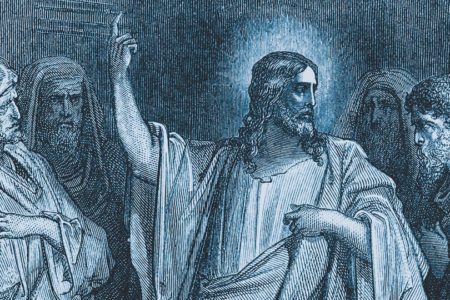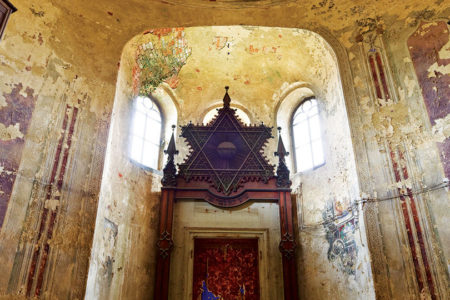Liberty, Love, and Life With Christ Conclusion
During its formative years, the church was entirely Jewish, as Jewish people by the thousands recognized Jesus as their long-promised Messiah. But by the end of the apostle Paul’s first missionary journey, a considerable number of Gentiles had joined the church. Many Jewish Christians felt the Gentiles should be circumcised and keep the Mosaic Law to be saved. The issue became so troublesome the church held a special meeting, the Jerusalem council, to settle the matter (Acts 15:19–31).
The fact that the Jerusalem council established a code of conduct for the church sheds light on the responsibilities of Christian institutions today. The law of Christian liberty lets believers practice anything God’s absolutes do not prohibit. However, God’s Word also teaches that Christians must refrain from offending the consciences of others—even if doing so entails restraining their own liberty in Christ. This rule also applies to Christian institutions, which have the right to require their members to adhere to standards of conduct.
The Jerusalem council decided Gentiles did not have to be circumcised and observe the Law of Moses to be saved and accepted into church membership. Faith in Messiah Jesus was all that was required. But the practical problem of Jewish sensitivity to certain Gentile practices remained. Gentiles and Jews came from two radically different cultural backgrounds, and the Mosaic Law shaped the Jewish conscience.
As a result, Gentile Christians were much freer in their actions than were Jewish Christians. The church had to decide what to do concerning the Gentile practices that would offend the Jewish conscience. New Testament scholar F. F. Bruce described the problem this way:
There remained, however, the practical difficulty that in most of the churches Gentile believers had to live alongside Jews, who had been brought up to venerate certain food-laws and to refrain as far as possible from intercourse with Gentiles….While there was no more question of requiring Gentile Christians to be circumcised and to keep the Mosaic law, these would do well to respect the scruples of their weaker Jewish brethren (all of whom could not be expected to become as emancipated as Peter or Paul), provided that there was no compromise on matters of principle.1
The early church functioned as an institution. The council of Jerusalem was not a spontaneous, informal gathering of a few Christians. It was an organized, formal church meeting that made difficult, practical decisions for its life and ministry.
The church instituted a specific code of conduct for its members. James, the leader of the church in Jerusalem, said, “Therefore I judge that…we write to them [Gentile believers] to abstain from things polluted by idols, from sexual immorality [fornication, KJV], from things strangled, and from blood” (vv. 19–20).
The code’s standards were specific, restrictive, and limited.
Specific. As an institution, the church provided four specific standards. It did not provide a general statement about conduct.
Restrictive. The council restricted the liberty of Gentile Christians, listing certain activities from which they should abstain.
Limited. The standards were limited to prohibiting certain practices of Christian liberty, not practices concerning God’s moral absolutes. The command concerning fornication may be an exception. However, Bruce and several other theologians believe that, within context, the passage’s use of the term fornication probably does not refer to sexual immorality.
Instead, it may refer to certain kinds of marriages forbidden for ceremonial rather than moral reasons to Jewish people under the Law (Lev. 18).2 But since the Mosaic Law had been set aside, those marriage laws became a matter of conscience. Had it not been for the presence of Christians whose consciences were sensitive about those things, any Christian would have had the right to indulge in them.
The church addressed the code of conduct to those who were freer in their practices (Gentile Christians), not to those who were weaker in faith (Jewish Christians). The code restricted the majority, not the minority, in the church.
Sir William Ramsay, an authority on the early church, explained that by the time of the Acts 15 council, Gentile Christians outnumbered Jewish Christians.3 Thus the church did not determine its code of conduct according to how many members would favor it.
The church did not tell the weaker minority it was wrong to have such scruples. Instead, the church lovingly protected their consciences.
The church addressed its code of conduct only to its own members. Church leaders never intended to instruct people outside the institution.
The church did not regard its code as something its members could accept or reject, according to their personal preferences. Its restrictions were “necessary things” (Acts 15:28) because of the large number of Jewish people who held strongly to the ceremonial aspects of the Mosaic Law (v. 21).
If church leaders referred to the consciences of both Christian and non-Christian Jews, they then had two reasons for instructing Gentile Christians to obey its code of conduct: (1) to prevent Gentile Christians from unnecessarily offending unsaved Jewish people whom the church hoped to reach with the gospel (1 Cor. 10:32) and (2) to preserve the church’s life and unity between Jewish and Gentile Christians (Eph. 2:11—3:6).
The church regarded the salvation of Jewish people and the life and unity of its church body as more important than the full exercise of Christian liberty.
The church was not being legalistic in establishing this code of conduct. Two facts support this conclusion:
First, Paul, a staunch opponent of legalism and proponent of Christian liberty, fully approved of this code. He did not protest it at the council but, instead, helped to deliver the written notice to the Gentile Christians (Acts 15:22–23). Evidently, Paul regarded the code as a valid restriction of Christian liberty and not a form of legalism. Bruce commented,
There is no good reason to suppose that Paul would have found the decree objectionable; where no compromise of principle was involved he was the most conciliatory of men (cf. 16:3; 21:26; 1 Cor. 9:19ff). In his epistles he himself urges that those who are strong in faith should voluntarily restrict their liberty in food and other matters, to avoid offending those with weaker consciences (cf. Rom. 14:1––15:6; 1 Cor. 8).4
Second, the Holy Spirit initiated and fully approved of the code of conduct (Acts 15:28). Bruce stated the Holy Spirit “was given prior mention as chief Author of their decision.”5 No doubt the Holy Spirit cared about the formation and keeping of this code since His ministry involves maintaining church unity (Eph. 4:3).
If this code of conduct was not legalistic, what, then, constitutes legalism? It is obvious from the Jerusalem council’s decision that an institution is not legalistic for simply establishing rules of conduct. Rather, the purpose for which it establishes its code reveals whether or not it is legalistic.
If a Christian institution wants to turn questionable practices into moral absolutes or sees its code as gaining merit from God, then the code is a form of legalism. But if the institution wants to show genuine love by not offending those with weaker consciences and truly wants to help its members avoid such offenses to enable more effective ministry, then it is not legalistic.
Gentile Christians gladly accepted the code of conduct: “They rejoiced over its encouragement [consolation]” (Acts 15:31).
According to theologian Richard B. Rackham, in the word translated “consolation,” the “meanings of consolation and exhortation run into one another and can hardly be separated.”6 Bruce likewise wrote that the word means both exhortation and relief.7
Thus the Gentile Christians were relieved to hear the good news that they did not have to be circumcised and observe the Law of Moses and were exhorted to hear the code of conduct.
But the main point of verse 31 is that they rejoiced over both parts of the council’s letter—the good news and the code of conduct. They were thrilled to be accepted as believing Gentiles into full membership in the church at Jerusalem, and they joyfully accepted the code of conduct. They regarded membership in the church and sharing in its ministry as more valuable than the ability to fully exercise their Christian liberty.
In conclusion, since the early church as an institution was justified in requiring all of its members to adhere to a code of conduct that was necessary because of its specific cultural situation, Christian institutions today are likewise justified in doing so.
ENDNOTES
- F. F. Bruce, The Acts of the Apostles (Chicago, IL: InterVarsity, 1952), 289.
- Ibid., 300.
- William M. Ramsay, Pictures of the Apostolic Church (Grand Rapids, MI: Baker Books, 1959), 134.
- Bruce, 289.
- F. F. Bruce, Commentary on the Book of the Acts (Grand Rapids, MI: Eerdmans, 1968), 316.
- Richard Belward Rackham, The Acts of the Apostles (London: Methuen, 1953), 257.
- Bruce, Acts of the Apostles, 300.








